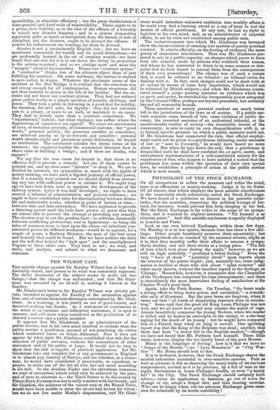THE WILMOT CASE.
THE specific charge against Sir Eardley Wilmot has at last been distinctly stated, and proves to be what was commonly supposed. The fuller discussion of the subject seems to make out two things,—that the charge was unfounded; and that Mr. Glad- stone was actuated by no in making it known to Sir Eardley.
Mr. Gladstone's letter to Sir Eardley Wilmot was strictly pri- vate, intended to apprize Sir Eardley of the accusation against him, and of certain intentions thereupon entertained by Mr. Glad- stone. As a warning, it was purely an act of good-nature, and deserved nothing but thanks. As a statement of conclusions in the mind of an eminent and influential statesman, it is open to censure, and still more when considered as the production of so shrewd a casuist and a public moralist. It appears that Mr. Gladstone, as an administrator of the public service, had in his own mind resolved to exclude from the public service a gentleman accused of not practising the virtue which conferred lustre on Scipio Africanus. Now it does not appear by what right Mr. Gladstone established that rule for the selection of public servants, without the concurrence of other statesmen and of the public at large. It would not be easy to show that the rule is capable of practical application. Let Mr. Gladstone take any complete list of any government in England or in almost any country of Europe, and see whether, as a states- man, he would have considered it practicable, or expedient, or proper, to strike out of the list all who had not acted according to his rule. In the Arabian Nights and the chivalrous romances we read of enterprises which could only be achieved by the pure, and of tests to ascertain it,—the Ninth Statue to be discovered by Prince Zeyn Alasnam was not to sully a mirror with her breath; and Sir Galahad, the achiever of the vacant seat at the Round Table, would have been unable to draw the sword had he lost his virtue : but we do not live under Merlin's dispensation, and Mr. Glad- stone would introduce unknown confusion into worldly affairs it he could even find a burning sword or a cup of tears to test the morals of official gentlemen. At any rate, he had no right to legislate in his own mind, and, as an administrator of imperial affairs, to act by rules not established among public men.
The embarrassments into which Mr. Gladstone was betrayed show the inconvenience of entering into matters of purely personal conduct. It admits officially, on the footing of evidence, the mere gossip of censorious tale-bearers. Here was Mr. Gladstone pre- pared to act, in a public capacity, on charges which prove to have been idle scandal, made by persons who withhold their names, and whom he has consented to listen to in some manner so irre- gular that he feels bound to conceal them from the consequences of their own proceedings I The charge was of such a nature that it could be referred to no tribunal : no tribunal exists for dealing with it. In fact, such charges could not be dealt with at all except by means of some holy inquisition, which would not be tolerated by British subjects; and when Mr. Gladstone consti- tuted himself a judge passing sentence on evidence which was ex parte and secret, he stretched the irresponsible power arrogated by the Colonial Office, perhaps not beyond precedent, but certainly beyond all reasonable bounds.
These questions of merely personal conduct are much better left to the jurisdiction of the laws or of society. If a public ser- vant commits some breach of law, some violation of public de- cency, the recorded sentence of an authorized tribunal, or the unmistakeable verdict of society—the irresistible decree of the community, is sure to carry its own disqualification with it, or to furnish specific grounds on which a public minister could act. If Mr. Gladstone had enunciated the rule, that official employ- ment could not be given to a gentleman labouring under sentence of law or " sent to Coventry," he would have heard no more about it. But when he lays down the rule, that a gentleman is disqualified until he shall have confuted the ex parte, secret, and unexpressed representations of a self-constituted society for the suppression of vice, who happen to have imbibed a notion that the gentleman has come within the operation of their own special laws, he establishes a principle of action in the public service which is most unsafe.


























 Previous page
Previous page